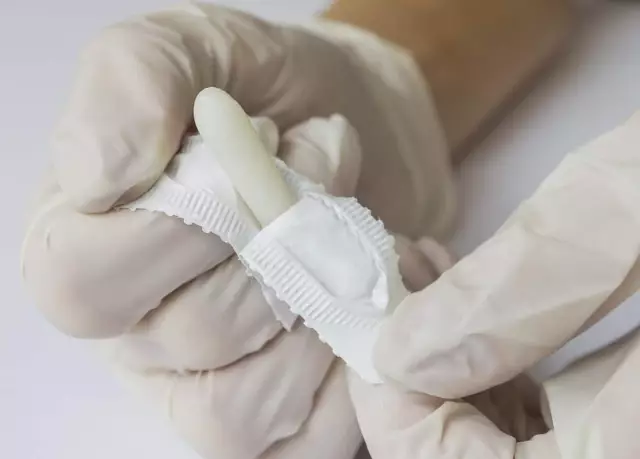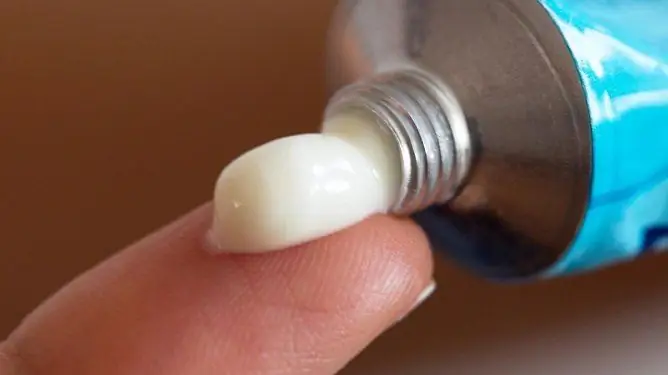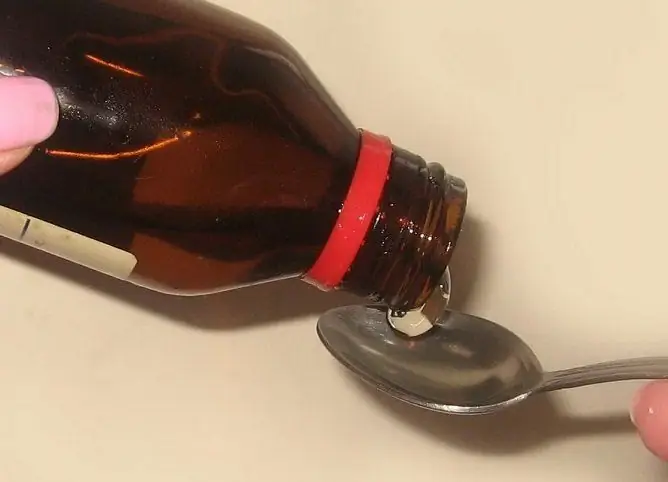- Author Rachel Wainwright wainwright@abchealthonline.com.
- Public 2023-12-15 07:39.
- Last modified 2025-11-02 20:14.
Cough drops are inexpensive but effective
The content of the article:
- Cough lozenges and rules for their use
- What lozenges are used to treat cough
-
How to make cough drops at home
- Ginger candy
- Mint candies
- Lemon candies
- Thyme and sage lollipops
- Video
Inexpensive but effective cough drops are among the most commonly used drugs. It is especially convenient to use drugs in this form if you need to stop coughing outside the home. It is necessary to use the drug in a timely manner, without waiting for the progression of the cough.
Cough is a common symptom that accompanies diseases of the respiratory tract, as well as some others (for example, "heart" cough with myocardial infarction). Therefore, before prescribing antitussives, it is necessary to find out the cause of its appearance. Despite the fact that lozenges for fighting coughs are sold without a prescription, it is recommended to consult a doctor before purchasing them, as even the best and most effective remedy can be harmful to health if used uncontrolled.

Antitussive lozenges can be taken by children from the age of three
Cough lozenges and rules for their use
Medicines for the treatment of cough for adults and children have different forms of release. Usually it is allowed to use cough drops for children from 3 years old, up to this age, the use of drugs in this form is undesirable for a number of reasons (children can swallow them without sucking, inhale, take more than required, mistaking for candy, etc.).). For children under 2 years old, medicines in syrups are usually used.
When treating cough with lozenges, you should follow a number of rules in order to get the maximum effect:
- Anti-cough lozenges should be used in combination therapy under the supervision of a physician.
- During treatment, it is necessary to avoid factors that cause irritation of the mucous membranes of the respiratory system (excessively hot, cold or spicy food, inhalation of dusty or too dry air, smoke, etc.).
- When using any drugs to treat cough, you must follow the doctor's prescription or instructions for use. If the doctor has prescribed to take the drug differently than recommended in the instructions, you should adhere to its appointment.
- Lozenges can be used as early as the first symptoms of the disease develop.
- The lozenges should not be chewed, they should be in the mouth until they are completely absorbed.
The action of lozenges is due to the medicinal substances that are included in their composition. So, licorice root reduces inflammation and spasms, promotes the excretion of phlegm from the body. Menthol, sage and eucalyptus provide an antiseptic, anti-inflammatory effect, etc. Medicines that contain menthol are contraindicated in children under 10 years of age.
Generally safe, lozenges, like any other drug, can have side effects. These include burning, itching, and hives. In some patients, cough drops can cause headaches, dizziness, daytime sleepiness, poor appetite, nausea, and high heart rate. If, during the use of the medication, the patient develops signs of allergies or other undesirable symptoms, stop taking it and consult a doctor.
Overdose during treatment with lozenges is rare. Cough drops, as a rule, do not interact with other drugs, therefore they are compatible with most of them (unless otherwise indicated in the instructions for the medicine).
What lozenges are used to treat cough
When choosing drugs for cough, it is necessary first of all to take into account the age of the patient and the characteristics of the cough. If, with a debilitating, persistent dry cough, there are no accumulations of mucus, the patient is prescribed drugs that suppress the cough reflex. If there is sputum when coughing, but it is difficult to separate, it is excreted in small quantities, drugs are prescribed that stimulate the synthesis of sputum and contribute to its liquefaction. With a wet cough, drugs are prescribed that lead to liquefaction and the early removal of sputum.
An effective remedy against unproductive and unproductive coughs are Doctor Mom lozenges, which have anti-inflammatory and expectorant effects. The drug is contraindicated in bronchial asthma, diabetes mellitus and a number of other diseases.
Lollipops Alex-Plus have an expectorant and antispasmodic effect. They are not prescribed during pregnancy and lactation, children under 4 years old, patients with bronchial asthma.
The drug Bronchicum has a mucolytic, expectorant, anti-inflammatory effect. It is used for acute and chronic bronchitis and a number of other respiratory diseases. Should not be used during pregnancy.
Lollipops Strepsils have an antibacterial and fungicidal effect. The drug is not recommended for the treatment of children under 5 years of age, as well as during pregnancy.

Strepsils - popular cough drops with different tastes, have an antimicrobial effect
Linkas lozenges have an expectorant and mucolytic effect. They are prescribed for acute respiratory viral infections, influenza, tracheitis, bronchitis, pneumonia. Not used in patients with diabetes mellitus, during pregnancy and lactation.
Travisil is used for various types of cough (including smokers), has an expectorant effect. It is not prescribed for individual intolerance to the components of the drug.
Licorice cough drops, which contain licorice root extract, help with dry and sore throat, have anti-inflammatory and anti-allergic effects. They are produced without sugar, having a lactose sweetener in their composition, therefore they can be used by patients with diabetes mellitus. Licorice lozenges are prescribed for respiratory infections as a mild expectorant. They are not used for individual intolerance to the components of the drug.
To soften the throat, bobs lozenges may be prescribed, which can be used every 2 hours (maximum dose is 10 lozenges per day). Do not apply in case of hypersensitivity to the components of the drug.
Inexpensive, effective and popular drugs for the treatment of cough also include Koflet, Halls lozenges.
Chinese-made cordyceps lollipops are quite popular, they are declared as an antiseptic, antimicrobial and antitussive agent. However, this drug is not certified in the Russian Federation, therefore, its origin and composition have not been confirmed by anything, therefore it cannot be recommended for use. It is strictly forbidden to take such dubious drugs to children, pregnant women, lactating women.
How to make cough drops at home
When coughing, not only antitussive lozenges made by the pharmaceutical industry according to GOST can be used, but also made by hand at home.
Ginger candy
To make one serving of ginger candies, you need to take granulated sugar (2/3 cup), water (2 tablespoons), juice of half a lemon, ginger root (2-3 cm), 2-3 pieces of cloves, 2 teaspoons of honey, powdered sugar … Peel and cut the ginger root. Grind the cloves in a mortar; you can also use ground cloves. The granulated sugar is placed in a suitable container (for example, a small saucepan). Water is added to the sugar, the container is put on fire. Lemon juice, ginger, cloves and honey are added to the mixture. After boiling, the fire is reduced, the caramel is cooked until it thickens, the mixture should acquire an amber color. Caramel is poured onto parchment paper or a cooking mat in small circles; you can use special silicone molds for candies and sticks for this purpose (see photo). After cooling, they are sprinkled with icing sugar and transferred to a storage container.

Homemade cough drops can be made on sticks - in this form, they are used with pleasure by children
Mint candies
3 tablespoons of sugar and 4 tablespoons of water are placed in an enamel container. The container is put on a slow fire, after 3-4 minutes mint leaves crushed into gruel and 1 teaspoon of lemon juice are added to the syrup. The syrup is poured into molds or on parchment paper, left at room temperature until it solidifies. Lozenges are used for unproductive coughs (for example, in the early days of an acute respiratory illness).
Lemon candies
5 tablespoons of honey are placed in an enamel container, 1 lemon zest, crushed on a fine grater, and 3 tablespoons of lemon juice are added. Balls are formed from the mixture, which must be left in a cold place for 1 day. Lozenges are used 3 times a day.
Thyme and sage lollipops
According to patient reviews, thyme and sage lozenges work well even with a strong cough. To prepare them, 2 tablespoons of sage and 1 tablespoon of thyme are poured with 1 glass of water and boiled in a water bath for 15 minutes. The product is allowed to cool, filtered, 1/2 cup sugar is added and boiled until the syrup begins to thicken. Then it is poured into molds or onto a silicone surface and left until the lollipops solidify. Store in a glass container, sprinkled with starch or powdered sugar. Lollipops are taken several times a day (with a strong cough - every 3-4 hours).
Video
We offer for viewing a video on the topic of the article.

Anna Aksenova Medical journalist About the author
Education: 2004-2007 "First Kiev Medical College" specialty "Laboratory Diagnostics".
Found a mistake in the text? Select it and press Ctrl + Enter.






